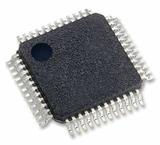●The ADS1601 is a high-speed, high-precision, delta-sigma analog-to-digital converter (ADC) manufactured on an advanced CMOS process. The ADS1601 oversampling topology reduces clock jitter sensitivity during the sampling of high-frequency, large amplitude signals by a factor of four over that achieved by Nyquist-rate ADCs. Consequently, signal-to-noise ratio (SNR) is particularly improved. Total harmonic distortion (THD) is –103dB, and the spurious-free dynamic range (SFDR) is 105dB
●Optimized for power and performance, the ADS1601 dissipates only 330mW while providing a full-scale differential input range of ±0.94VREF. Having such a wide input range makes out-of-range signals uncommon. The OTR pin indicates if an analog input out-of-range condition does occur. The differential input signal is measured against the differential reference, which can be generated internally on the ADS1601 or supplied externally.
●The ADS1601 uses an inherently stable advanced modulator with an on-chip decimation filter. The filter stop band extends to 19.3MHz, which greatly simplifies the anti-aliasing circuitry. The modulator samples the input signal up to 20MSPS, depending on fCLK, while the 16x decimation filter uses a series of four half-band FIR filter stages to provide 75dB of stop band attenuation and 0.001dB of passband ripple.
●Output data is provided over a simple 3-wire serial interface at rates up to 1.25MSPS, with a –3dB bandwidth of 615kHz. The output data or its complementary format directly connects to DSPs such as TI’s TMS320 family, FPGAs, or ASICs. A dedicated synchronization pin enables simultaneous sampling with multiple ADS1601s in multi-channel systems. Power dissipation is set by an external resistor that allows a reduction in dissipation when operating at slower speeds. All of the ADS1601 features are controlled by dedicated I/O pins, which simplify operation by eliminating the need for on-chip registers.
●The high performing, easy-to-use ADS1601 is especially suitable for demanding measurement applications in sonar, vibration analysis, and data acquisition. The ADS1601 is offered in a small, 7mm × 7mm TQFP-48 package and is specified from –40°C to +85°C.

 Part 3D Model
Part 3D Model
